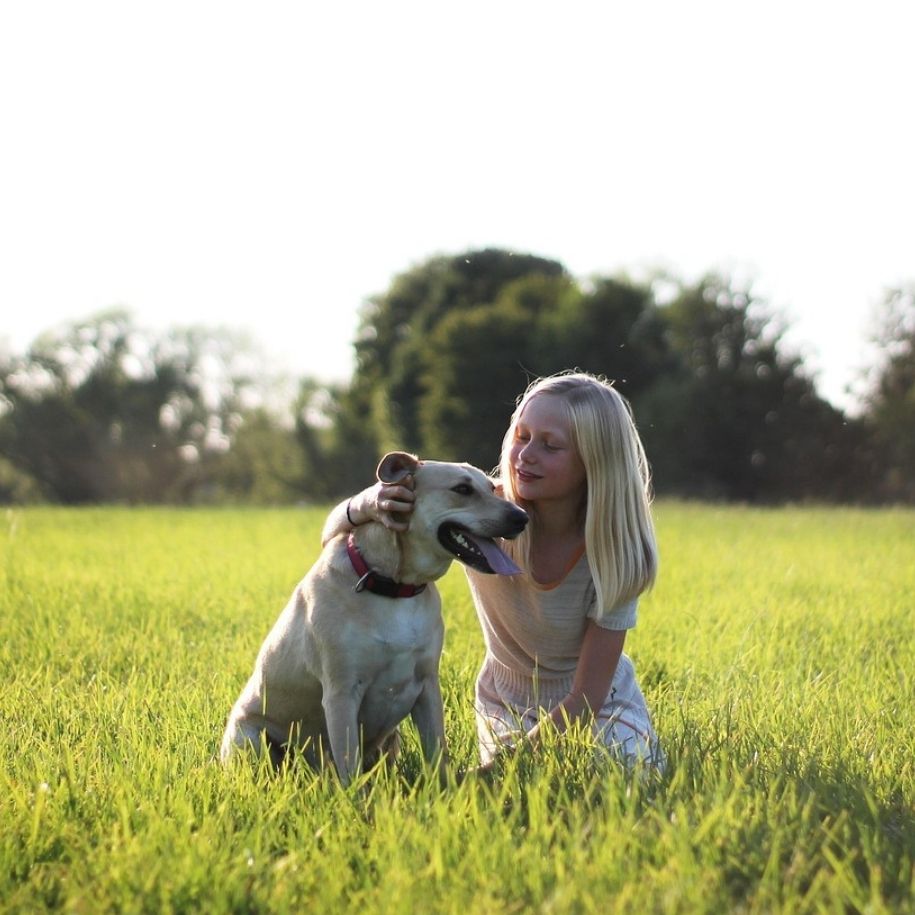Golden Retrievers sit firmly in the UK’s list of popular dog breeds—they were among the top gundog registrations with The Kennel Club last year. Their winning mix of a kind nature, dense double coat and eagerness to work has also kept them in steady demand as guide dogs and therapy dogs across Britain. If you want a companion that is easy to train, gentle with children and sociable with other pets, a Golden could be your ideal dog. In this article you’ll understand the dog breed’s early story, and pick up care tips that keep these healthy dogs happy in our rainy climate.
History and Origin
The Golden Retriever breed began in Scotland during the 1800s. A nobleman named Lord Tweedmouth wanted to create the ideal hunting dog—one that could retrieve game from water and land, stay close to its owner, and remain gentle with people. He crossed a wavy-coated retriever with a Tweed Water Spaniel bitch, a now-extinct water dog known for its intelligence and loyalty.
These early yellow puppies became the foundation of the modern Golden Retriever. Over time, more crosses were added to improve the dog’s strength and tracking abilities, including Flat Coats, Labrador Retrievers, Red Setter, and Bloodhounds.
By 1903, the dog breed was officially recognized by The Kennel Club in the UK. In 1920, the Golden Retriever Club helped define breed standards that breeders still follow today. Across the pond, the American Kennel Club accepted the breed in 1925. Today, the dog breed is supported by a national breed club in both countries, and its popularity keeps growing.
This early history gives us insight into why Goldens are still so good at canine sports, obedience, and working roles. Their origins as hunters gave them not just stamina, but also an eagerness to please—something modern families still benefit from every day.
Golden Retriever Characteristics
Golden Retrievers are well-known for their broad head, soft expression, and wagging tail. Their gentle appearance matches their friendly nature, making them one of the most loved dogs for Britain family. But beyond their looks, they have strong bodies built for work.
-
Size: Adult Goldens are considered large breed dogs. Males typically weigh 30–34 kg, and females 25–29 kg.
-
Coat: They have a dense double coat that is water-resistant. This helps keep them warm in cold, wet weather but also means golden retrievers shed—a lot!
-
Colour: Shades range from pale cream to deep gold, but red and mahogany are not accepted under breed standards.
-
Energy Level: Golden Retrievers need regular physical exercise and mental stimulation. Without it, they may get bored and even destructive.
Despite their size, they’re known to be gentle. Each individual dog may differ slightly, but most Goldens share the same social, eager-to-please temperament. Their lifespan typically ranges from 10 to 13 years, with some healthy dogs living even longer if they receive proper care and pet insurance is in place to support medical needs.
Golden Retriever Lifespan
Golden retrievers typically live 10–12 years. They progress through:
-
Puppy (0–12 months): learning basic commands, social skills, on controlled walks.
-
Young adult (1–3 years): athletic prime, high training responsiveness.
-
Middle aged (4–7 years): may begin showing joint problems, weight gain, early health concerns.
-
Senior (8+ years): require softer food, more frequent vet visits, joint support, warm bedding, and lighter exercise.
Monitoring life expectancy, regular vet checks, and lifestyle adjustments help your golden remain healthy and happy longer.
Golden Retriever Temperament
Golden Retrievers are loved for their friendly, patient, and loyal nature. They are famously easy to train, which is why they’re often used as guide dogs, therapy dogs, and search and rescue dogs. They want to be with their people, and that love of human interaction is one of the breed’s most special traits.
These dogs get along well with other pets, including other dogs and even cats. With early socialisation, they quickly learn to be calm around new people and environments. This makes them a great choice for busy households or first-time owners.
-
Gentle and kind – ideal for families with young kids.
-
Eager to please – which makes training fun and rewarding.
-
Loyal and dependable – always ready for a cuddle or a game of fetch.
-
Sociable – they don’t like being alone for more than four hours, which can lead to separation anxiety.
Are Golden Retrievers good with kids?
Absolutely. Their gentle nature and patience make them great family pets. That said, it’s always important to teach children how to respect dogs—no tail pulling or rough play. When raised in a loving home, Goldens are one of the most excellent family dogs you can choose.
Golden Retriever Care
Looking after a Golden Retriever means meeting both their physical and emotional needs. They’re not just pretty dogs—they’re working dogs at heart, and they thrive when they have a job or daily routine.
Daily Exercise
A Golden Retriever needs at least 1–2 hours of daily exercise. This could include long walks, games of fetch, or swim sessions (they love water!). Lack of exercise can lead to weight gain and behavioural issues.
Mental Stimulation
Because they’re intelligent, Goldens benefit from training sessions, mentally stimulating dog toys, and new challenges. Joining activities like obedience or canine sports is a great way to keep them sharp.
Time and Attention
Golden Retrievers aren’t dogs you can leave alone all day. If you're out for more than four hours, consider a dog walker or pet sitter. These dogs crave human interaction and can get anxious if left alone too long.
Routine Vet Care
Regular health checks, flea or ticks treatments, and vaccinations are essential. Since Goldens are prone to hip dysplasia, elbow dysplasia, and progressive retinal atrophy, early health tests are crucial. The UK Kennel Club and BVA offer screening schemes for breeding stock to help reduce inherited health conditions (source).
Pet Insurance
Pet care can get expensive. Good pet insurance ensures you’re covered for both emergencies and long-term conditions like arthritis problems or skin allergies.
Meeting these care needs will give your Golden the best chance at a long, happy family life.
Golden Retriever Grooming
Golden Retrievers have a dense double coat that keeps them warm but also means they hair loss— a lot. Daily use of a slicker brush lifts loose under-coat and stops mats before they form. The Kennel Club says medium-to-long–coated dog breeds like Goldens may even need a quick brush every day to keep the coat tangle-free. A weekly session with a de-shedding rake helps manage the heavy shed that arrives in spring and autumn. Bathing every six to eight weeks in a mild dog shampoo cuts doggy odour without stripping coat oils. Trim the feathering around feet and ears to reduce mud pick-up on wet UK walks. Regular checks of ears and nails, plus a gentle comb through the long tail plume, complete the routine. When grooming Golden Retrievers becomes a habit, you protect furniture, keep skin healthy, and bond with your dog at the same time.
Common Health Problems in Golden Retrievers
Most Goldens live long, healthy dogs lives, yet good owners stay alert to breed-linked issues.
-
Hip dysplasia, elbow dysplasia, arthritis and joint problems, especially in middle aged and older adults.
-
Cancer risks – UK Vet Compass data shows higher rates of haemangiosarcoma, mast-cell tumour and lymphoma in Goldens than in many other dogs. Early vet checks save lives.
-
Eye disease – yearly tests catch progressive or multifocal retinal dysplasia that can affect sight.
-
ear infections - Golden Retrievers are dogs with floppy ears. If water accumulates in the ears and is not cleaned in time, it will cause ear infections, so dog owners must be sure to do dog's ear cleaning.
-
Heart Problems - Subaortic valvular stenosis (SAS) is a genetic heart condition that Golden Retriever puppies inherit from their parents.
-
Obesity – large dog breed pups that grow too fast strain the hip joint; control calories.
Early detection and treatment—comfort, quality, regular ear cleaning, bathing, grooming needs, and regular exercise—can help manage these health conditions. Engage a veterinarian who can monitor for signs of pain, lameness, discharge, and symptoms of disease.
Golden Retriever Nutrition and Feeding
Goldens burn energy fast during daily exercise, so feed a quality large breed kibble rich in joint supporting omega-3s. The PDSA advises splitting a dog’s daily food allowance into two meals and counting treats toward the total. For a 30 kg adult that means roughly 300 g of complete food; adjust to keep a visible waist. Puppies need measured portions to avoid rapid weight gain that may potentially affect developing hips. Always provide fresh water, skip fatty human foods, and add puzzle feeders for extra mental stimulation. Good balanced diet with exercise keeps weight stable, lowers health issues like arthritis, and supports a longer life expectancy.
Golden Retriever Family Compatibility
Absolutely—if you can match their social needs. These dogs crave company and can develop separation anxiety if left alone more than four hours. Early socialisation teaches them to live happily with other pets and gentle children; their soft mouth means they rarely nip when youngsters teach children to throw a ball. Because Goldens are easy to train and eager to please, they shine in therapy dogs, search and rescue dogs and even fun canine sports. Daily walks, play retrieves and steady rules turn this loving retriever into one of the UK’s great family pets.
Golden Retriever Puppies and Rescue
Buying: Start with the Golden Retriever Club breeder list or the Kennel Club Assured Breeders scheme. A reputable breeder shows hip, elbow and eye certificates for both puppy’s parents and raises pups in a busy home for solid early socialization. Expect to pay £1,200 – £1,500 for a well-bred golden retriever puppy in 2025.
Rescuing: If you’d rather adopt, check the RSPCA “Find a Pet” page for rescue dogs needing homes. Adoption fees (£200–£400) often include neutering and microchipping—now a legal must for UK dogs by eight weeks, or owners face a £500 fine.
Whichever route you choose, budget for quality food, insurance, and regular vet care so your new friend starts life on the right paw.
FAQs
Is a Golden Retriever a good family dog?
Yes. Their gentle nature, patience with kids, and love of play put them among the UK’s top family dogs. Early training and daily exercise keep behaviour polite.
What is the hardest part of owning a Golden Retriever?
Managing the coat and the need for company. Golden Retrievers shed year-round and dislike being alone for long stretches, so time and grooming tools are a must.
What is the price of a Golden Retriever?
In 2025 UK listings show an average of about £1,400 for a well-bred puppy from a reputable breeder, though top show lines can exceed £2,000. Rescue adoption is cheaper and saves a life.
Can Golden Retrievers be left alone?
Short periods, yes, but aim for under four hours. Provide toys and gradual training to avoid stress. Longer absences need a pet sitter or dog-day-care.
Conclusion
Whether you’re drawn to the breed’s sunny smile, their work as guide dogs, or fond memories of a childhood companion, the Golden Retriever remains one of Britain’s most popular dog breeds for good reason. Meet their need for grooming, exercise and human time, and you’ll gain an energetic friend who lights up your family life for years to come.






